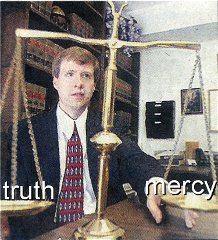Same-Sex Marriages
The past few days headlines highlight the growing debate over same-sex marriages. "Nebraska's ban on same-sex marriage overruled." "A year later, gay marriage law still debated." "Poll: Americans decry same-sex marriages."
Court vs. Congress. A fight of historic proportions is brewing. Nebraska was one of the states in 2000 where seventy percent of the voters voted to amend their state constitution to define marriage as a union between one man and one woman. But last week one federal judge struck down the new law as unconstitutional. Judge Joseph Bataillon said the amendment "imposes significant burdens on both the expressive and intimate associational rights" of gays "and creates a significant barrier to the plaintiffs' right to petition or to participate in the political process."
Law vs. Legitimacy. In an effort to legitimize same-sex unions, gay rights groups have organized as never before and are promising to fight - "Once you've tasted full equality there is no going back" said Cheryl Jacques, the former president of the Human Rights Campaign who married her partner recently. Following the fight in Massachusetts where the Supreme Court of that state forced the state legislature to legitimize same-sex unions, 6,000 couples have married. Neighboring Connecticut legalized "civil unions" one step short of according full equal marital status and gay rights activist immediately sought the same legitimacy in California, Oregon and New York but those attempts ultimately failed. On the other hand 18 states responded with constitutional amendments outlawing same-sex marriages bringing the total states with specific laws on the books to 40. The federal government has a similar law - the Defense of Marriage Act - but the Massachusetts ruling calls into question the constitutionality of the law which is why President Bush has called for a constitutional amendment. States are left in a difficult position as the 6000 married couples in Massachusetts move across the country and seek to enforce recognition of their status under Article IV of the U.S. Constitution which requires states to give full faith and credit to the laws of another state. Who will prevail? The people through their representatives or the courts.
Polls vs. People. There have been several reports published on polls showing the American people equally divided over this issue. The poll released Sunday immediately hit all the news outlets proclaiming that 50 percent of Americans disapprove of gay marriages, while 37 percent approve and 11 percent are neutral. The same poll said 46 percent of people favored some form of civil union recognition while 41 percent opposed. The Boston Globe commissioned the survey conducted by the University of New Hampshire Survey Center. The poll is completely contrary to the overwhelming defeat of gay marriage inititiatives in the majority of states where the smallest margin is close to 60 percent and is usually significantly higher. However, the media will continue to seek to portray this as a dividing issue with "intolerant" conservatives on one side and "open minded" people on the other.
Liberty vs. License. The Massachusetts Goodwin case ignited this firestorm. In that cases the court wrote: "Our obligation is to define the liberty of all, not to mandate our own moral code." The concept of liberty used by our founding fathers was never intended to be used as a license to do whatever one wished. The concept was deeply rooted in the natural law tradition and it was only when an act clearly abrogated the "Laws of Nature and of Nature's God" as Jefferson wrote in the Declaration of Independence that it did not have to be followed. When we remove the fixed star of natural law from our jurisprudence we condemn ourselves to drift in a sea of rights without a compass to guide us.
Church vs. Christ. How can the church be at odds with Christ? The church is to be the bride of Christ, but we have too often been an adulterous bride running after the world. When the church removes the fixed star of inerrancy and the divine nature of Christ from our theology we too condemn ourselves to drift in a sea of rights without a compass to guide us. How can we stand for truth if we don't have something to measure what truth is? If that measuring stick is the ever-shifting will of the people, we are in serious peril. The history of the church and civilization should teach us the dangers of such folly.
Christ died for all because all have sinned and fall short of the glory of God. Gay rights are unhappy wrongs. Like all sexual sin the end is destruction. The church should reach out to this community with the good news of the gospel of peace, but we should not abrogate truth in the process. Jesus claimed to be God. He claimed to be the truth. Either he is right in which case we should live in obedience to him or he is wrong and we are to be pitied above all men. Let's live lives worthy of the calling to which we have been called and take a stand for truth in a world that would rather believe a lie.
COMMENTS? For more information about Administer Justice visit our website at www.administerjustice.org.

